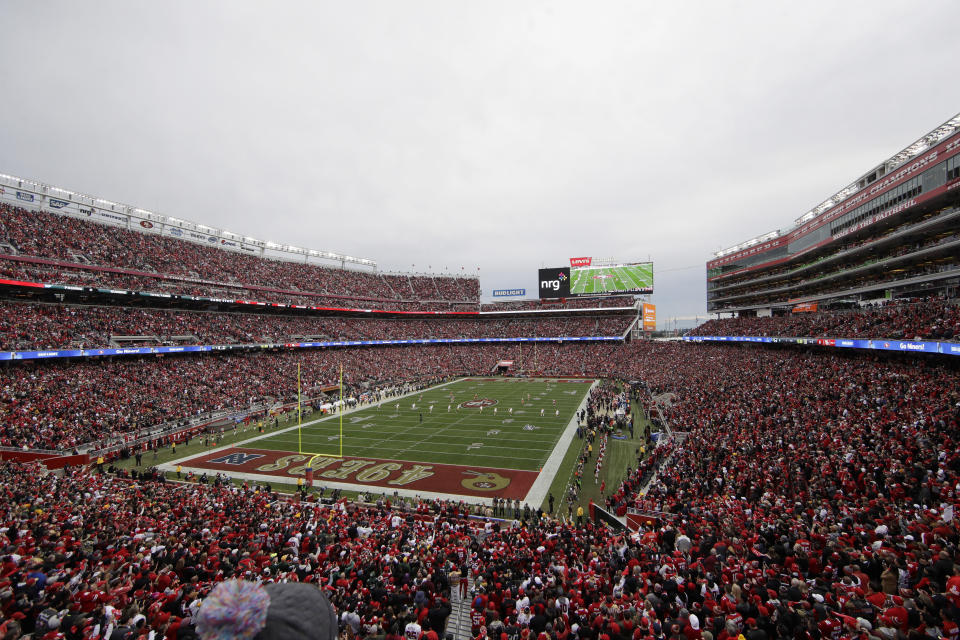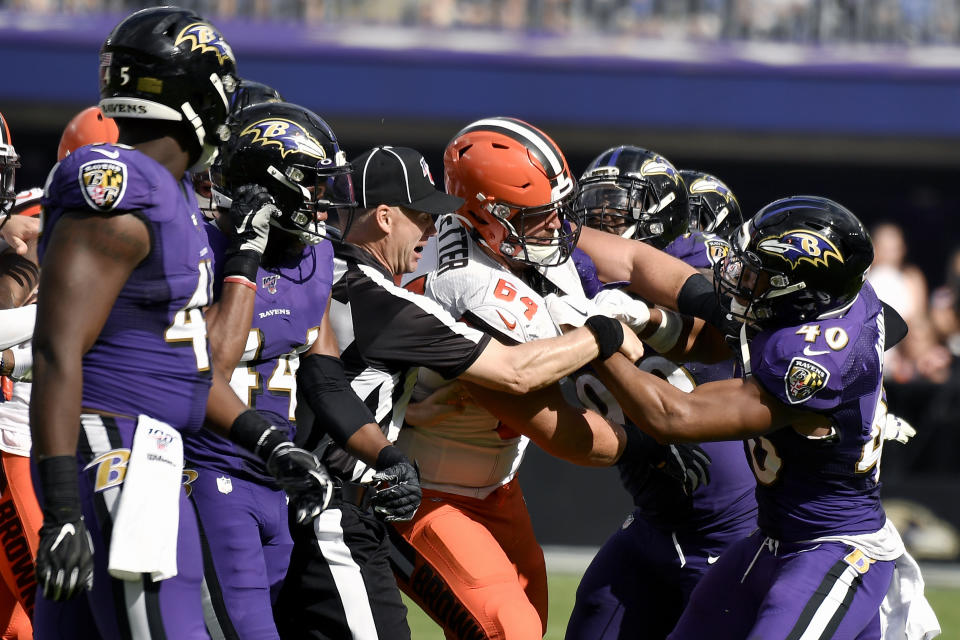NFLPA president: CBA 'no' vote would've meant different world for players
On the morning of March 15, a day before the Dow Jones Industrial Average recorded its worst one-day points drop in history, the NFL Players Association announced that its membership had approved a new 10-year collective bargaining agreement with team owners.
The CBA passed by a mere 60 votes, and it came after much internal debate. Some highly influential veterans, like Green Bay’s Aaron Rodgers, thought it was a bad deal. Others thought it was a good one for its rank-and-file members.
During the lead-up to the vote, Cleveland Browns center JC Tretter took a diplomatic approach in his bid to be elected NFLPA president, laying out both sides of the deal to his fellow players. His constituents, apparently, appreciated his moderate stance, as the board of player representatives eventually elected him union president days later.
What has followed for Tretter over the past two months has been a whirlwind, as he has tried to get up to speed amid the COVID-19 pandemic.
“It feels like several years, based off where we’re at right now,” Tretter joked in a recent phone interview with Yahoo Sports in which he laid out his thoughts on the fortuitous timing of the new CBA, elaborated on how his acclimation to his new job has gone and expressed his plans for the union.

Was timing favorable for NFL players?
Since Tretter’s election in March, the coronavirus has gripped America. At least 80,000 people have died, the economy has been thrown in flux and millions have lost jobs as people grapple with how to deal with the worst pandemic in a century.
There is a level of uncertainty about what a post-COVID world will look like, especially as it relates to the likelihood of pro football being played in the fall.
“I think everything’s very much up in the air,” Tretter said, when asked if football will be played in a matter of months. “And obviously the virus is something that, the new information we get, [says] is continually changing and continually emerging and we’re getting a better grasp of what it entails and what’s needed to handle it. This is about health and safety in general life, and making sure that our players aren’t put at a risk or at a danger by playing the game and going to work.”
While the future remains uncertain, Tretter agreed that things could have been more chaotic for him and his brethren if the CBA wasn’t approved a few months ago. That scenario would have forced the league and its players back to the negotiating table amid economic calamity, which historically hasn’t meant great leverage for workers, regardless of industries.
“Obviously, you can never tell what the future would have held,” Tretter said, “but anytime there’s economic uncertainty, and beyond just the dip in the market we saw, the overall uncertainty of the virus and what’s going to happen ... it would have been a tough spot to be in.”
Take a look back at 2008, Tretter noted, when team owners exercised an opt-out clause with a few years left and forced players back to the negotiating table, resulting in the longest lockout in league history in 2011.
“What was going on in 2008? An economic downturn,” Tretter said. “So it’s not a giant leap to think that this would have been a much bigger battle, with everything going on in the market and the world.”

‘Hindsight, this time, came like five days down the line?’
The last contentious CBA was an agreement in which the players gained concessions in safety and benefits, and in the end they made a lot of money. However, they gave back 3 percent of total revenues, decreasing their total share from a 50/50 split, a point of contention among some players and agents in the years since.
While it remains to be seen how the CBA deal the players just ratified will turn out — it increased players’ share to a maximum of 48.5 percent but they had to agree to a 17th game in return — there’s a chance what they signed was the best one they were going to get.
“Usually hindsight comes like five, 10 years down the line,” Tretter said. “And I feel like hindsight, this time, came like five days down the line. You look back a week later and it’s like, ‘Oh, wow, if that vote shifts 61 votes, this is a different world that we’d be living in.’ So it’s definitely a good point.”
Even though those negotiations are in the rearview mirror, Tretter still has plenty of work to do. The uncertain nature of the upcoming league year means that NFL revenues, which are split between the league and its players, could go down. That could affect the salary cap in a significant way in 2021, unless team owners and the NFLPA figure out a way to recoup the revenue that could be lost if forced to play games without fans or hammer out an agreement to account for the decreased 2020 revenue and prevent a significant cap drop next season.
As for what any of that would look like, or what may be on the horizon, Tretter doesn’t want to speculate.
“I haven’t gotten that far because I’ve tried not to live in hypotheticals,” Tretter said. “Think back to what two months ago looked like, right before or when we first started going into quarantine. To start thinking about all these what-ifs three months out, I think you just go down a rabbit hole and each answer — and I put the word ‘answer’ in quotes — you think of, 10 more questions come up from that and you kind of almost get paralyzed with these hypotheticals because there’s just so many.”

Virtual meetings, workouts and union work
To accommodate his new reality, Tretter said he has tried to live in two-week segments, all while managing his very full calendar.
That life starts, he noted, with first taking care of his day job, which consists of participating in the Browns’ virtual workouts. NFL teams are currently allowed to conduct four-hour classroom sessions four times a week, an arrangement that could extend through the scheduled conclusion of teams’ offseason workout programs on June 26, he said.
“I know what time I need to watch film and be on my Zoom call, and I get all that done,” said the 29-year-old Tretter, a three-year starter for the Browns. “I’ve got a garage gym that I’m working out at, so I can be pretty self-sufficient during this time. The workouts really haven’t been a problem; I’ve been able to stay in shape and do everything I would be doing if I was going into the facility.”
And since he’s not going anywhere due to social distancing, that makes it easier for him to shift from football player to NFLPA president at a moment’s notice. His predecessor, Eric Winston, has been very helpful as the two speak regularly, Tretter said.
Tretter, who went to Cornell and majored in industrial labor relations, has the time and the accommodations to make the job work. Whenever he needs to shift into union mode, all he has to do is walk into his man cave, where he has a desk and a laptop, and start plugging away at making phone calls and reading documents.
“With the virtual offseason we have now, you’ve got your two hours of meetings and you do your workouts but you have a lot of free time to do other things,” Tretter said.
The road ahead in solidifying unity after tight NFLPA vote
At the moment, much of Tretter’s free time has been spent speaking with his constituents, some of whom — like former Carolina Panthers safety Eric Reid — have been vocal about their displeasure about the new CBA or any matter of things pertaining to the business of football.
Tretter prides himself on encouraging discussion among his constituency. He even reached out to Reid, who criticized Tretter in late March for not directly addressing concerns over post-vote changes in the wording of the newly passed CBA.

“I feel like it’s my job to represent all players, and to do that you need to hear all opinions and all ideas,” Tretter said. “I hope every player feels comfortable contacting me and reaching out and asking questions or just giving their perspective on issues, because it’s something I’ll always want to hear. I think that’s the best way to kind of lead and take charge of a group.”
Action works too, especially during these stressful times. Earlier this month, Tretter told players in a newsletter that the union’s 11-member executive committee will review the changes to the total and permanent disability benefit in the new CBA, which could take away thousands of dollars in benefits from permanently disabled former players.
“There’s been some questions about it, just within ourselves, of ‘Can we do anything else with this?’” Tretter said. “That’s something that I think is such an important part of our CBA, looking out for our retired players, that I want to kind of jump on that right away and start working through different ideas and different plans and getting the guys together and not really waiting very long and instead, really look into what we can do to fix that program and help out these guys.”
As far as unifying the union, it’s a start. Tretter knows there’s lots more work to do on several fronts if he intends to deliver on his plan to help players bond together in an uncertain world.
“The strength in any union comes from unity, and that doesn’t mean we all agree on every issue,” Tretter said. “I don’t mind debate; I don’t mind guys speaking what they feel and discussing what they like and don’t like. What I don’t want is division — that’s when you start going in a bad direction as a union.
“So the debate and people discussing the things they like, the things they don’t, that’s great. And something I’ve continued to say: if you were somebody who wanted something else in the CBA or still want to see changes, keep that same energy and passion because we don’t have to wait eleven years to make some of the changes we’re looking for. We can continue to fight for those things in the near future, so the more people that feel like speaking passionately and getting involved, if they feel they can still make a change, that’s invaluable.”
More from Yahoo Sports:


